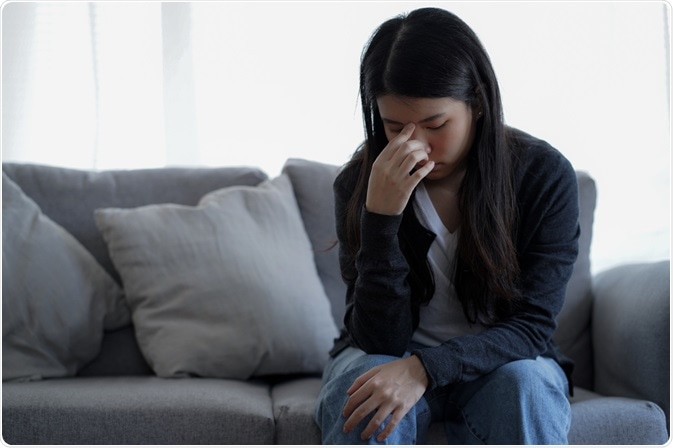More than half of those who recover from COVID-19 go on to report fatigue months later. As of July 2021, there were more than 182 million confirmed cases of COVID-19 and likely more not guaranteed with a test.

Image Credit: KomootP/Shutterstock.com
With such large numbers of people worldwide impacted by this new disease, it is vitally important that all data relating to the impact of COVID-19 on health is collected, analyzed, and interpreted. As the pandemic endures, data continues to emerge revealing the prevalence of what has been coined 'long COVID', which is often characterized by lingering fatigue and a wide range of other symptoms.
Long COVID and extreme fatigue
COVID-19 symptoms may persist for more than a year. As many as 376,000 people living in the UK who have been infected with COVID-19 report they continue to experience symptoms over 12 months later2. Extreme fatigue long after COVID-19 recovery is just one example, along with a wide range of other lingering symptoms.
While fatigue is a typical consequence of falling ill from a virus, it usually resolves itself after several weeks. Even when an infection has been cleared from the body, tiredness is likely for some time after. Difficulties with cognition and memory are also a possibility.
However, data gathered from those who have recovered from COVID-19 highlights the unusual endurance of symptoms, particularly tiredness, for months after recovery. Given that COVID-19 is a new disease in humans, longitudinal data is not available, so it is unclear how fatigue may continue to be a part of a person’s life in the years to come.
The data shows that a significant portion of those who have recovered from COVID-19 have not been able to return to work due to their persistent symptoms. There are concerns for the future as these effects may further impact the economy, the cost of long-term treatment, and might worsen general wellbeing.
Current research has found no relationship between lingering, extreme fatigue and the severity of COVID-19 symptoms, such as the requirement for hospitalization, supplemental oxygen, or critical care. However, there is some evidence to suggest that women may be more at risk of suffering persistent fatigue. Additionally, those who were previously diagnosed with anxiety or depression may also be at an elevated risk.
More research is needed to fully understand the nature of persistent fatigue in those who have recovered from COVID-19. Currently, those suffering from constant fatigue should treat it the best they can by following specific steps agreed by medical professionals to improve fatigue.
Treating fatigue
People suffering from fatigue are advised to try and sleep more while observing healthy sleep habits. Avoidance of caffeine and viewing screens before bed is encouraged to enhance the quality of sleep. Obtaining sufficient nourishment is also advised and is particularly important to facilitate recovery from illness.
For those suffering from long COVID-19, there is no specific advice regarding recommended activity levels. People with long COVID are a diverse cohort, with varying sets of symptoms ranging in severity. Generally, it is advised that activity is kept light for those with fatigue, with people encouraged to engage in basic and necessary activities without exacerbating their tiredness.
However, scientists do not currently agree on how best to treat patients with long COVID-19. Experts suggest that treatment plans should be tailored to the individual and should find a balance between avoiding both deconditioning and post-exercise malaise.
Although there are many challenges for clinicians treating patients with long COVID-19, an opportunity to grow our understanding of postviral syndromes exists. Until now, sufficient attention has not been given, and research into such conditions is lacking. With long COVID-19, there is a chance to gather vast amounts of data that may help people recovering from other types of viral infections.
While there is a great deal of uncertainty when treating patients experiencing extreme fatigue after recovering from long COVID-19, new evidence is opening up potential lines of inquiry. Recent data has found a link between long COVID and insomnia. Research has found that COVID-19 may disrupt sleep patterns, resulting in elevated levels of insomnia in those both suffering from and having recovered from COVID-19.
These increased levels of insomnia may, at least, be partially responsible for the extreme fatigue that has become commonplace with COVID-19 recovery. Increasing good quality sleep may be an effective method of reducing both of these afflictions. Though, more research is needed to understand the relationship between COVID-19 and sleep disorders fully. There is hope that the link between the two might be uncovered in the future, enabling more effective treatments for extreme fatigue following COVID-19.
References
- Covid map: Coronavirus cases, deaths, vaccinations by country. BBC News. Available at: https://www.bbc.co.uk/news/world-51235105
- Prevalence of ongoing symptoms following coronavirus (COVID-19) infection in the UK: 4 June 2021. Office for National Statistics. Available at: https://www.ons.gov.uk/peoplepopulationandcommunity/healthandsocialcare/conditionsanddiseases/bulletins/prevalenceofongoingsymptomsfollowingcoronaviruscovid19infectionintheuk/4june2021
- Newman, M., 2021. Chronic fatigue syndrome and long covid: moving beyond the controversy. BMJ, p.n1559. https://www.bmj.com/content/373/bmj.n1559
- Tony, A., Tony, E., Ali, S., Ezzeldin, A. and Mahmoud, A., 2020. COVID-19-associated sleep disorders: A case report. Neurobiology of Sleep and Circadian Rhythms, 9, p.100057. https://www.sciencedirect.com/science/article/pii/S2451994420300092
Further Reading